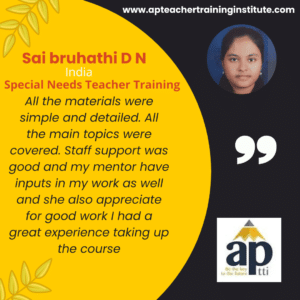Key Skills for Special Educational Needs Teachers
Special Educational Needs (SEN) teachers play a crucial role in the lives of students with diverse learning needs. Special needs teachers must possess unique skills and competencies to effectively support and empower these learners. This blog will explore what it takes to be a successful SEN teacher and the importance of specialized training. So, what are the key skills and competencies that a special needs teacher should possess?
What is the Understanding of Special Educational Needs?
The foundation of effective SEN teaching begins with a deep understanding of Special Educational Needs itself. What exactly is SEN? These encompass a wide range of learning differences, including but not limited to autism, dyslexia, ADHD, and physical disabilities. A competent SEN teacher should be well-versed in the various types of SEN and how they can impact a student’s learning experience. Specialized courses and training programs in special educational needs, such as those offered by accredited teacher training institutes, are invaluable in developing this understanding.
Tailoring Instruction to Individual Needs in Special Educational Needs
One size does not fit all in the realm of special educational needs. The ability to tailor instruction to individual students’ needs is paramount. How can a teacher ensure each student’s unique requirements are met? It requires adaptability, patience, and creativity. Special educational needs courses often focus on strategies for differentiated instruction and adapting teaching materials to suit diverse learning styles, ensuring that no student is left behind.
What are the Effective Communication and Collaboration Special Educational Needs?
SEN teachers must also excel in communication and collaboration. How can they ensure effective interaction with both students and their support networks? Communication skills are key to building rapport and trust with students, while collaboration with parents, caregivers, therapists, and other professionals is crucial for holistic support. Special educational needs courses often emphasize the importance of maintaining open lines of communication and working as part of a multidisciplinary team.
Patience and Empathy with Special Educational Needs Students
Patience and empathy are virtues that cannot be overstated in the world of special educational needs. How can a teacher foster a positive and inclusive learning environment? By understanding the unique challenges that students with SEN face and responding with patience and empathy. These qualities help create a safe and nurturing space where students can thrive academically and emotionally.
Continuous Learning and Professional Development
The field of special education is constantly evolving. How can a special needs teacher stay current with best practices and innovations? Continuous learning and professional development are essential. Special educational needs courses, including online teacher training options, provide opportunities for teachers to stay updated on the latest research, strategies, and technologies that can benefit their students. Ongoing learning is not only a necessity but a commitment to the growth and success of the students they serve.
Advocating for Inclusion and Equality
Special needs teachers are not just educators; they are advocates for inclusion and equality. How can they promote a more inclusive society? By advocating for the rights and needs of their students, raising awareness about Special Educational Needs, and challenging stereotypes and prejudices. A competent SEN teacher is not only a classroom leader but a catalyst for positive change in the broader community.
Conclusion
In conclusion, the role of a special needs teacher is both rewarding and challenging. To excel in this field, one must possess a deep understanding of Special Educational Needs, the ability to adapt instruction to individual needs, effective communication and collaboration skills, patience, empathy, a commitment to continuous learning, and a passion for advocacy. Special educational needs courses and online teacher training courses provide aspiring SEN teachers with the knowledge and tools they need to make a meaningful impact on the lives of students with diverse learning needs. With the right skills and competencies, SEN teachers can unlock the potential of every student and help them thrive in their educational journey.





